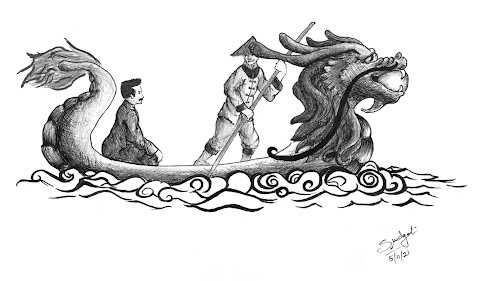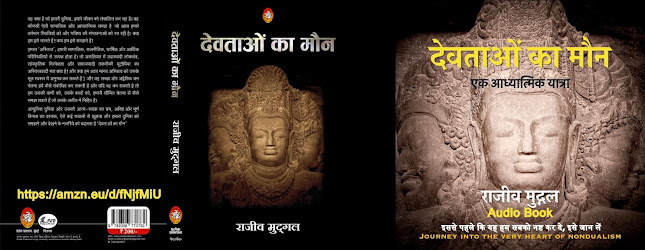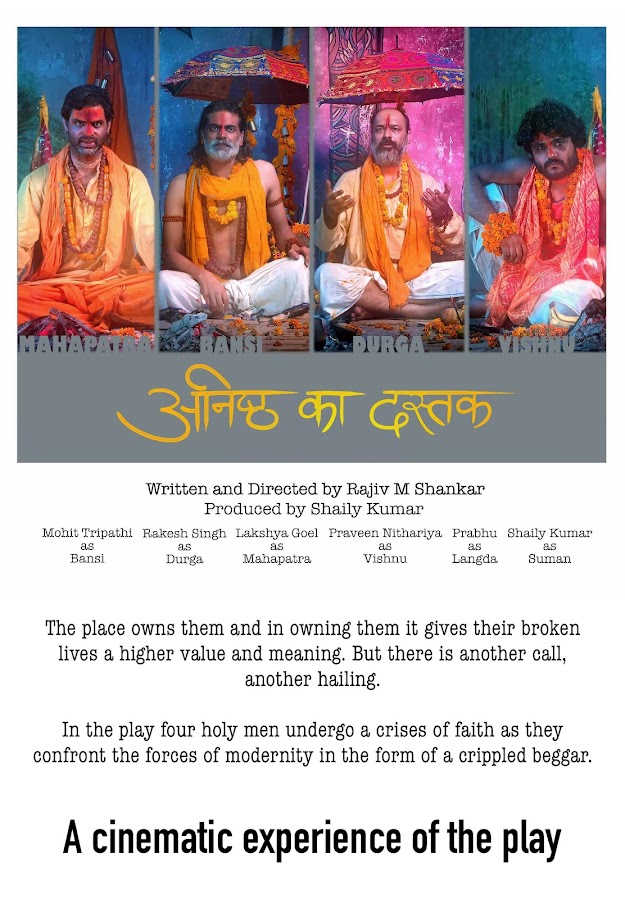Lu Xun’s Last Journey
Lu Xun’s Last Journey
(Short story - 1990)
Illustration credit - Shashwat
When Lu Xun died, he woke up frozen in a monolith with his name chiseled in granite, captured and enslaved; he lay trapped in the state mausoleum of the ‘willing ox’ feeding on the sentiments of visitors. Then one fine morning, his spirit finally caved in and died and he found himself on a boat ferrying across the river of mist.
His silence was broken by the voice of the boatman who hailed his name and asked… “Tell us Lu Xun, what happens to Ibsen's Nora after she leaves home?”
“What about her?” asked Lu Xun, confused and disoriented, “and what future does she have without any economic means or social support.”
“So you agree that having abandoned her identity as a woman and mother entangles her into a courtesans paradox.”
“Wait!” said Lu Xun, “wait, not so fast”, he looked around and mumbled “where are we…”, then faintly recalling that he had died and somehow his spirit was caught and caged in a statue, it lived there frozen in the stone nourished only by the slavish salutes of the visitors, then eventually his spirit too had died of neglect only to reappear mysteriously on this boat.
“Where are we”, Lu Xun inquired, “and who are you?”
“I am the body of all the dead authors murdered by the mad tyrant in your name” replied the boatman.
“My name…but how..what happened”.
“Don’t you know that you are hailed as a saint of modernity, the father of communism, as well as the commander in chief of its cultural revolution.”
“By whom”
“By none other than the great Tyrant”.
“Wait, wait, who?”
“Never mind…I only wanted to know about Nora.”
“Nora” said Lu Xun, “is the blueprint of Chinese revolution, she symbolises the common people, her secret is embedded in the understanding that only when the whole of society is liberated can a women liberate herself”, then whispering softly he murmured, “listen carefully what I am about to speak; if Nora only leaves to gain ‘her’ freedom and ‘her’ independence then its amounts to petty nationalism but if she leaves her house to take up the gun, to burn down her house, shoot the husband, hang her parents, then she truly is a revolutionary.”
A silence fell upon the river, no words were exchanged for a long time, then Lu Xun spoke rubbing his eyes, “tell me”, he said, “tell me about this Tyrant and his madness, but keep it brief and short.”
“What can I say!” replied the boatman, “when madness descends, even snakes appear as dragons, man eats man, sons burn their father, daughters hang their mother, brothers hunt each other out and the dead are left to rot
“Don’t play games with me, stranger” said Lu Xun, “paint in the details.”
“All right ” said the boatman, “The way of the world is stranger than the way of man, and still only man can lie and dream, build temples, launch ships, navigate using constellations, fly aircraft’s, split the atom and still stranger is his mastery over his hunger, he among all the apes grows his own food, domesticates cow, extract fat from milk, lights fire and spin his own tools and somehow he also knows how to calculate his own profit…and still they say or so have I heard that when the political slips outside of public control, then masters and slaves make their appearance among the same clan. When people are slow to realise their own mistakes, the accompanying winter swallows them whole. Knowing that nothing ever changes under the heavens, revolution only offer institutions as though it were a new one. For whoever has the power to shape his and others life is a master and one who has no power to shape his own life remains a slave, and where vileness flourish, there grievances and injuries go unattended, then poets like wood worms daringly crawl out of their rotting logs, risking their lives they construct a stage worthy and fit for mad tyrants...”
“Details” shouted Lu Xun now clearly agitated by the oracularity of the boatman.
“Hear then”, said the boatman, and started speaking about the way of the tyrant, his sycophant courtiers, his private army and their inglorious deeds.
“It so happened,” he began the fable, “It so happened that on the day when the moon sank into its ocean and the sun delayed its rise, the great tyrant had a dream. When he woke up, he immediately assembled all the lieutenants of his private army and ordered each one of them to snatch all farms across the length and breath of the land and declare their wife, children and their houses as belonging to him and his state run commune; and by this evil act, overnight, the farmers were transformed into landless slaves.
Half of the farmers died in shock and the rest were beaten and tortured by the greedy and corrupt private army of the tyrant who in their barbaric cruelty turned their own people into animals, into creatures with no will or rights of their own and when they complained they were starved and left to die.”
“With the death of millions the social fabric of our world fell apart, millions committed suicide and the countryside appeared bleak and barren… famine and flood’s did the rest by sweeping away what ever little remained.”
“When things fell apart, the corrupt and vile officials started fudging numbers by reporting inflated and grandiose figures of harvest and having done so began torturing and beating the peasants for lying and hiding the harvest and when there was nothing left to eat, the farmers cooked bark with clay and when no more trees were left and the fire within their stomachs felt unbearable, they swallowed lumps of coal and thus survived a little more.”
“The situation had became so bad that people would just drop dead, and while houses were filled with rotting corpses no one dared to say a word, and those who did were routinely executed, skinned alive, poisoned and helped to the other world by various cruel means.”
“And when his own men started loosing trust in him, the tyrant said, ‘no penalty should apply to our own critics’ and having said so, he made sure that they were all rounded up, exposed and slaughtered; and when he said ‘they may die for speaking the truth but eventually will be hailed as heroes for speaking out against the mighty’, he made sure to extract a public confession of their sins, execute seven degrees of their relations so that no trace of their existence ever remained.”
“Then one dark morning the tyrant was woken up by another dream, immediately he ordered his assembled comrades to turn farms into steel factories. Soon his army forced the peasants to set up steel furnaces on their farm and asked them to use whatever wood they could lay their hands on and when the trees disappeared, doors, windows, furniture and beds were used as fuel, and nails, locks, drawer handles, doorknobs as well as kitchen utensils such as pot and pans were used as scraps for steel. And as the farming fell into neglect, half of the peasants died of starvation and the steel they produced turned out to be useless.”
“When crops and steel failed, the blame fell on the cheating and lazy peasants. So to punish them his cadets beat them up with sticks, some comrades developed unique and novel ways to humiliate the malnourished peasants, they just buried them alive, while others were thrown bound into ponds, stripped naked and forced to labor in the middle of winter and when they complained of cold they were doused in boiling water. When nothing worked, they were forced to ingest excrement and urine, and subjected to mutilation or thrown into concrete bunkers where their hair was ripped out and their noses and ears lopped off. Hungry, starving and broken, the dying peasants started killing and eating other peasants and soon cannibalism began to spread.”
Alarmed by the developments, when the tyrant was informed about the unfolding tragedy he said ‘When there is not enough to eat people starve to death. It is better to let half of the people die so that the other half can eat their fill’.
And thus the Great Leap Forward became the greatest leap of death.”
But his other three dreams were even more tragic…”
“Stop, enough…no man can be this cruel, so stop lying about the tyrant” said Lu Xun almost choking, then he coughed a few times and complained about the dryness in his throat.
No sooner had he felt thus, a pot of tea appeared out of nowhere.
“Would you like me to serve you a warm cup of honeyed ginger tea,'' asked the boatman, “it will comfort your distress.”
“But…How come.”
“I have no idea!” said the boatman, “but…oh wait, there is a little note attached which reads ‘a gift from Lao She’. Would you like me to read out the note to you in full.”
“Sure…go ahead.”
The boatman lifted the pot and poured its contents in a white porcelain cup which had rings of gold on its edge and bottom, and having served him the warm tea read:
‘Just like Tea drinking happens to be a cultural activity, It is also economics, as habit inducing it rattles the world market, as habits it shapes cultural practices, as need and necessity it moulds the spirit and as livelihood it transforms the historical, geographical, and the social ideology of societies -Warm regards from the Tea House.
“Mercantilism” mused Lu Xun, “its walk might be our cursed destiny, but I fail to get the full gist of this…and why this here and why now!”
“I thought you already knew, for among the intellectuals it is understood that ‘Tea’ symbolises the spirit of man, his poetry, his language, his fable and his most mysterious essence -his voice, and ‘House’ his cultural activity, ‘Warm Regards’ here means the mourning of the people and a remembrance of the atrocities we endured and the total grief and devastation we suffered at the hands of demons who trapped us in their dreams, dreams that were fundamentally flawed and problematic to start with.
In short, it pleads for the rehabilitation of the past culture, the restoration of the intellectuals to their place of honour, and as a place of gathering it wants us to celebrate the openness of the tea house and register it as a beacon of open society.”
“What happened to Lao She!”
“The red guards beat him up and having been humiliated and tortured, they threw his wounded body to drown in the lake.”
“Did he survive…”
“No”
“Oh…ok,” and after a long pause he spoke, "tell me boatman, tell me about the madness of the mad”
No sooner has he spoken thus, the mist that had engulfed them began to clear, suddenly the boatman and his boat blinked and vanished in thin air, bewildered and baffled he found himself mysteriously floating and eyeing a wonderful women in labour, she had a large bindi on her forehead and wore a green sari, beside her stood an old woman assisting her pains and outside he could see a nervous man in dhoti and kurta wet and sweating. He kept walking to and fro, to and fro, then he would stop as if to hear and once again break into his nervous walk.
As he stood there he felt a strange pull. He could sense that there was something marvellous and beautiful about this woman, it was as if she radiated a strange and marvellous scent of blue lotuses, her mourn felt like…like the raga of the fabulous gaandharvas. He wondered how the two were linked to smell, the profoundest of all senses, the specter of olfactory response, the odors as the creatix of likes and dislikes, the pleasant and the unpleasant. And no sooner had he thought so the world around him blinked again and the next moment he found himself coming out of the womb and crying loudly for the sins of the past…
On the day of his birth, astrologers were summoned in who drew up his charts. The stars were favourable and spoke about a successful and prosperous life except when he hit his 50th year... “What will happen on his 50th year”, asked his father. “He” replied the astrologer “would abandon all the worldly ways and walk on the path of Heaven.”
Vaman as he was so named in this new avatar was jolted into selfhood with the taste of honey and milk administered ritually to him on the sixth day of his life. For the first time he experienced pleasure ripple across his being awakening his infant senses by a hundred thousand and one poetic kisses instantly chiseling the bodily being into existence as I Am. […]


